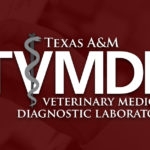Texas A&M Veterinary Medical Diagnostic Laboratory (TVMDL) Assistant Agency Director for Microbiology and Research Kiril Dimitrov, DVM, PhD, was part of three groups that recently published journal articles covering avian paramyxoviruses. Dr. … [Read more...] about Dimitrov contributes to literature over avian paramyxoviruses
News
*Update 1/24 Canyon lab will be closed*
* Update 1/24 TVMDL Canyon will be closed today, January 24 due to inclement weather. Continue to monitor tvmdl.tamu.edu for updates to the Canyon lab's operating hours.* Due to inclement weather, TVMDL’s Canyon laboratory will open at 10 a.m. on … [Read more...] about *Update 1/24 Canyon lab will be closed*
Two professionals recognized with Texas A&M AgriLife Vice Chancellor’s Awards in Excellence
Texas A&M AgriLife has announced the 2023 recipients of the Vice Chancellor's Awards in Excellence. Among those honored are two professionals from the Texas A&M Veterinary Medical Diagnostic Laboratory (TVMDL). TVMDL Veterinary … [Read more...] about Two professionals recognized with Texas A&M AgriLife Vice Chancellor’s Awards in Excellence
Lemburg honored with Vice Chancellor Award in Excellence
Rodney Lemburg, program coordinator, is the recipient of the 2023 Texas A&M AgriLife Vice Chancellor Award in Excellence for Business and Operational Staff. Lemburg has served in the operations department of the Texas A&M Veterinary … [Read more...] about Lemburg honored with Vice Chancellor Award in Excellence
Five employees honored with Director’s Excellence Awards
The Texas A&M Veterinary Medical Diagnostic Laboratory (TVMDL) has announced the 2022 recipients of the Director's Excellence Awards. Given annually, the Director's Excellence Awards recognize outstanding employees who exemplify excellence … [Read more...] about Five employees honored with Director’s Excellence Awards
Sheppard honored with two awards for service to veterinary medicine
Guy Sheppard, DVM, veterinary diagnostician at the Texas A&M Veterinary Medical Diagnostic Laboratory (TVMDL), has been recognized with two awards for his service to veterinary medicine. Sheppard is the recipient of the 2022 TVMDL … [Read more...] about Sheppard honored with two awards for service to veterinary medicine
Buckner recognized as Director’s Excellence Award recipient for 2022
Sydney Buckner has been recognized as the 2022 recipient of the Texas A&M Veterinary Medical Diagnostic Laboratory’s (TVMDL) Director’s Excellence Award in the student category. Buckner has served as a student assistant in the necropsy … [Read more...] about Buckner recognized as Director’s Excellence Award recipient for 2022
Larson recognized as recipient of 2022 Director’s Excellence Award
Malerie Larson, technician in the toxicology laboratory, is the 2022 recipient of the Texas A&M Veterinary Medical Diagnostic Laboratory’s (TVMDL) Director’s Excellence Award in the technical category. Larson has been a dedicated TVMDL … [Read more...] about Larson recognized as recipient of 2022 Director’s Excellence Award
Schulz recognized as Director’s Excellence Award recipient
Bailey Schulz, administrative coordinator, is a 2022 recipient of the Texas A&M Veterinary Medical Diagnostic Laboratory (TVMDL) Director’s Excellence Award in the administrative category. Schulz joined TVMDL in 2020 as a member of the … [Read more...] about Schulz recognized as Director’s Excellence Award recipient
Rosario receives 2022 Director’s Excellence Award in administrative category
Sydney Rosario, poultry programs administrator, is a 2022 recipient of the Texas A&M Veterinary Medical Diagnostic Laboratory (TVMDL) Director’s Excellence Award in the administrative category. Rosario joined the laboratory three years … [Read more...] about Rosario receives 2022 Director’s Excellence Award in administrative category
TVMDL adds panel to test catalog to aid in the detection of strangles
The Texas A&M Veterinary Medical Diagnostic Laboratory (TVMDL) now offers a new strangles testing panel to assist equine clients in the detection of strangles. Earlier this year, TVMDL announced the addition of a multiplex real-time polymerase … [Read more...] about TVMDL adds panel to test catalog to aid in the detection of strangles
Texas Animal Health Commission updates trichomoniasis testing requirements
On December 27, the Texas Animal Health Commission (TAHC) updated the requirements for the Texas Trichomoniasis Program. Among the updates, TAHC increased the duration of transport time for direct smegma samples shipped in phosphate buffered saline … [Read more...] about Texas Animal Health Commission updates trichomoniasis testing requirements
College Station laboratory to experience brief power outage Tuesday, December 20
The Texas A&M Veterinary Medical Diagnostic Laboratory’s (TVMDL) College Station laboratory is scheduled to undergo routine maintenance to its electrical distribution system on Tuesday, December 20. All electricity to the facility will be briefly … [Read more...] about College Station laboratory to experience brief power outage Tuesday, December 20
TVMDL to discontinue cyanide and nitrate testing for hay and forage samples
Due to a decrease in requests, the Texas A&M Veterinary Medical Diagnostic Laboratory (TVMDL) will soon discontinue nitrate and cyanide (prussic acid) testing for hay and forage samples. Starting immediately, TVMDL will no longer accept hay … [Read more...] about TVMDL to discontinue cyanide and nitrate testing for hay and forage samples
Hensley recognized as 2022-2023 Regents Fellow Service Award recipient
The Texas A&M University System (TAMUS) Board of Regents has recognized Texas A&M Veterinary Medical Diagnostic Laboratory (TVMDL) Assistant Agency Director for Diagnostic Services Terry Hensley, MS, DVM as a 2022-2023 Regents Fellow Service … [Read more...] about Hensley recognized as 2022-2023 Regents Fellow Service Award recipient
Chronic Wasting Disease testing: TVMDL’s role in protecting Texas wildlife
As the state veterinary diagnostic laboratory, the Texas A&M Veterinary Medical Diagnostic Laboratory (TVMDL) tests hundreds of thousands of samples annually. However, on the brink of each year’s deer hunting season, test numbers begin to spike … [Read more...] about Chronic Wasting Disease testing: TVMDL’s role in protecting Texas wildlife
TVMDL retires Avian Encephalomyelitis Virus (ELISA)
The Texas A&M Veterinary Medical Diagnostic Laboratory (TVMDL) has retired the in-house Avian Encephalomyelitis Virus (ELISA) due to a significant decrease in demand. As an alternative testing option, TVMDL can refer samples to the University of … [Read more...] about TVMDL retires Avian Encephalomyelitis Virus (ELISA)
Three TVMDL pathologists earn board certifications
Three pathologists at the Texas A&M Veterinary Medical Diagnostic Laboratory's (TVMDL) College Station laboratory recently earned board certifications from the American College of Veterinary Pathologists (ACVP). Karena Tang, DVM, DACVP, Rocío … [Read more...] about Three TVMDL pathologists earn board certifications
Forensic pathology/legal necropsy examinations
A forensic or legal necropsy as defined by the purposes of the Texas A&M Veterinary Medical Diagnostic Laboratory (TVMDL) is a necropsy done to attempt to determine the cause of death in cases where the death is known or suspected to be … [Read more...] about Forensic pathology/legal necropsy examinations
TVMDL professionals co-author publication covering concurrent canine distemper and Tyzzer disease infection
Two professionals from the Texas A&M Veterinary Medical Diagnostic Laboratory (TVMDL) were among a team of authors who recently published an article in the Journal of Veterinary Diagnostic Investigation. In the article, Pam Ferro, PhD, molecular … [Read more...] about TVMDL professionals co-author publication covering concurrent canine distemper and Tyzzer disease infection
Collaborative project leads to improved diagnostic detection of strangles
Research initiated at the Equine Infectious Disease Laboratory (EIDL) at Texas A&M University aimed at exploring the genomic components of strangles has now led to an improved assay at the Texas A&M Veterinary Medical Diagnostic Laboratory … [Read more...] about Collaborative project leads to improved diagnostic detection of strangles
Cerebrospinal Nematodiasis (Visceral Larval Migrans) in Birds
Cerebrospinal Nematodiasis (Visceral Larval Migrans) in Birds Martin Ficken, DVM, PhD, ACPV Nematodes of the genus Baylisascaris are recognized as causes of avian cerebral nematodiasis. Baylisascaris columnaris, the ascarid of skunks and … [Read more...] about Cerebrospinal Nematodiasis (Visceral Larval Migrans) in Birds
Collecting hair for livestock drug testing
The collection of hair samples should be undertaken by a competent individual within a secure, contamination-free facility. Hair is a strong, stable tissue that is simple to collect, transport, and store. Data suggest hair is as effective a matrix as … [Read more...] about Collecting hair for livestock drug testing
Fu joins College Station laboratory as pathologist
On Monday, August 22 Dah-Jiun Fu, BVM, MVM, PhD joined the College Station laboratory as an anatomic pathologist. Fu earned a Bachelor of Veterinary Medicine and a Master of Veterinary Medicine from National Taiwan University in 2007 and 2009, … [Read more...] about Fu joins College Station laboratory as pathologist
Spironucleosis (Hexamitiasis) in Quail
Spironucleosis (Hexamitiasis) in Quail Martin Ficken, DVM, PhD, ACPV A flock of approximately 10,000 Coturnix quail, aged 5.5 months, were experiencing mild diarrhea and various vague neurological symptoms resulting in a spike in mortality over … [Read more...] about Spironucleosis (Hexamitiasis) in Quail























